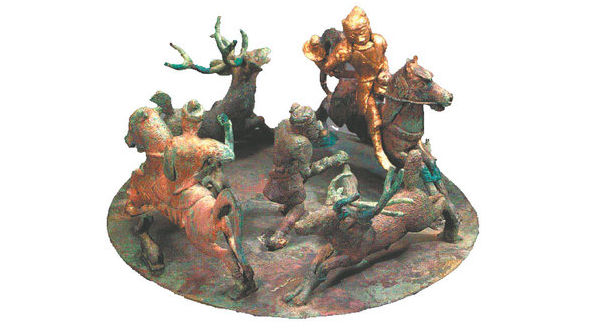A bronze cowrie container (pictured) with a lid depicts the hunting scene of the Dian people who lived along the shores of Dianchi Lake in Kunming of Yunnan province over 2,000 years ago. [Photo provided to China Daily]
From the late Warring States Period (475-221 BC) to the Western Han Dynasty (206 BC-AD 24), along the shores of Dianchi Lake in Kunming of Yunnan province, there existed an ancient civilization known as Dian.
Although archaeologists have yet to uncover any written language from this civilization, a large quantity of uniquely shaped bronze ware unearthed in the last century serves as a vivid historical record of the ancient civilization, bringing to life the story of this regional state that once thrived more than 2,000 years ago on the southwestern frontier of China.
Unearthed in the 1950s from Shizhaishan and Lijiashan sites in Kunming, Yunnan province, a treasure trove of ancient Dian currency (cowrie shells) and over 10,000 bronze ware were discovered. Among them stands out a unique type of bronze artifacts: bronze cowrie containers with decorative covers featuring vivid miniature sculptures.
In the ancient Dian Kingdom, which was far from the sea, cowrie shells were rare and became a kind of currency as valuable as gold and silver. The nobles thus created special bronze containers to store these shells, much like today's piggy banks.
However, for the Dian people, the cowrie container was much more than a mere storage vessel: It was a symbol of wealth, power, and status, and played a crucial role in ancestral rituals.
"These bronze artifacts are unique to the ancient Dian people, never found in other regions, and is regarded as the representative artifact of the Dian bronze civilization," says Fan Haitao, deputy director of the Yunnan Provincial Museum in Kunming, where lots of these cowrie containers are housed and exhibited.
"While bronze ware from the Central Plains region mostly features symbolic and abstract patterns, the style of Dian bronze artifacts is more realistic and closely related to everyday life", says Fan.


 Share:
Share: 





 京公網安備 11010802027341號
京公網安備 11010802027341號 主站蜘蛛池模板:
剑阁县|
盘锦市|
涞水县|
潼南县|
信宜市|
绥德县|
台南市|
定襄县|
沙河市|
增城市|
县级市|
百色市|
平江县|
融水|
南部县|
板桥市|
盱眙县|
临汾市|
醴陵市|
修武县|
临夏市|
开江县|
屏东市|
布尔津县|
正安县|
邵武市|
成武县|
安康市|
大竹县|
平泉县|
丹寨县|
大厂|
樟树市|
元谋县|
孟州市|
尚义县|
乐昌市|
衡水市|
本溪市|
剑河县|
渝北区|
主站蜘蛛池模板:
剑阁县|
盘锦市|
涞水县|
潼南县|
信宜市|
绥德县|
台南市|
定襄县|
沙河市|
增城市|
县级市|
百色市|
平江县|
融水|
南部县|
板桥市|
盱眙县|
临汾市|
醴陵市|
修武县|
临夏市|
开江县|
屏东市|
布尔津县|
正安县|
邵武市|
成武县|
安康市|
大竹县|
平泉县|
丹寨县|
大厂|
樟树市|
元谋县|
孟州市|
尚义县|
乐昌市|
衡水市|
本溪市|
剑河县|
渝北区|